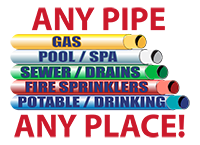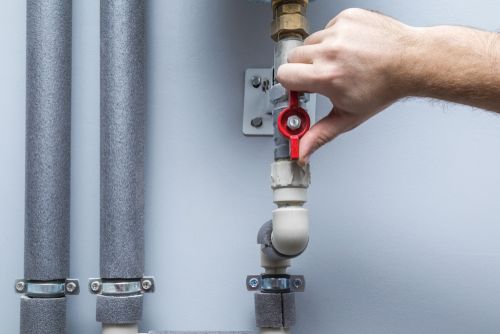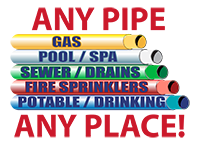You just noticed a small puddle of water near your water heater and you aren’t sure if you need to do anything about it right now. If you have a busy schedule, a water heater leaking might not seem like a big deal. It’s the problem that you can’t see that could end up causing you a lot of trouble and expense.
Often, a water heater has to stop working before you’re ready to admit there’s a problem. It’s better to address the problem while it’s still in the early stages. After all, even a water heater leaking a small amount of water onto your floor can cause damage beyond the top surface. Also, even though the evidence is minor, the cause could be much larger.
No small water heater leak will go away on its own. Whatever is causing the problem is only going to get worse. By the time you jump into the shower only to find you have no hot water at all, you could face serious flooding, the expense of extensive repair bills, and the need to replace a lot of damaged materials including sub-flooring and walls. Not only can the water leaking from your water heater damage your physical property; it can also lead to serious health problems.
Mold and Mildew
Mold and mildew thrive in wet environments, posing a health risk to you and your family. Some common symptoms include coughing and wheezing, throat irritation, nasal congestion, irritation of the eyes or skin. Those with existing respiratory illnesses such as allergies or asthma have an even higher risk of having more severe symptoms.
One of the most important steps you can take to protect your family from mold is to control the humidity levels in your home. Preventing mold from growing is easier than removing it from inside your walls and ventilation system once it is already there.
Now that you know how serious a water heater leaking is, you know you need to do something about it; but what? Follow the steps below to decide what you need to do next.
Step 1: Identify the Source of the Leak
Unless your water heater is the only thing in an enclosed room where none of your family members or pets go, there’s no guarantee that the water came from a water heater leak. In most cases, there are different types of plumbing nearby. It’s also possible that a child spilled a drink or your pet didn’t make it outdoors in time!
Wipe away the puddle and watch the area to see if any more water appears. Look at the water heater fittings to see if there are any signs of a leak. Check the ceiling overhead in case the leak is from water pipes between the downstairs and upper level of your home.
If the source of the leak turns out to be a plumbing issue, don’t wait to contact an expert in leak detection and repair. Remember that the plumbing system providing water to all areas of your home is interconnected. The problem that you see may just be the tip of the iceberg!
If, in spite of your best efforts, you can’t find the source of the leak, place some paper towels over the area and return to check them every so often. If they remain dry, it’s possible the puddle was something other than the water heater or plumbing leaking.
If the water returns to the area and there is no sign of a leak from any other source, the water heater is probably the cause. One advantage of using this method to find the source of the leak is that a spot in the center of the paper towels shows that the leak is above. One that travels across the edge of the towels points in the direction of the water source.
Step 2: Disconnect the Power
When the water heater is working correctly, the combination of electricity and water poses no threat. When an electric water heater begins to leak, the water can reach the electrical supply and create a dangerous situation.
Once you confirm that you have a water heater leak, turn off the power to the unit. Turn off an electric water heater by finding and switching off the appropriate breaker in the breaker box.
Gas water heaters usually have an on/off switch or dial that you can simply turn to the ‘off’ position. It’s best not to close the gas shut-off valve to prevent potential failure later on.
Step 3: Turn Off the Water Supply
Find the location of your cold water shut-off valve. This valve is typically located above the water heater. You should only follow this step if you can do so without coming into contact with the leaking water. Unless the water heater has stopped heating, the water is hot enough to cause serious burns from contact with your skin.
If the leak is severe, find the main shut-off valve for the entire house and close it. This will stop the water flow to your water heater without putting you at risk of getting burned. It’s always a good idea to find out where the main shut-off valve is located in your home before you need to know.
Step 4: Find the Source of the Leak
Investigate the problem to gather as much information as possible before the plumber arrives. Start by checking the cold water inlet and hot water outlet connections on the water heater. Loose connections often cause minor leaks that are fast and easy to fix.
Water heaters include a safety device on the inside of the tank that relieves the temperature and pressure in case the water is too hot or too much pressure builds inside the tank. If you feel confident in examining the T/P valve, check the area where it connects with the tank. A water heater leaking at this point is easy to spot. You will see water running down the side of the tank. Although the plumber can repair a faulty valve or a situation where there is too much pressure in the tank, this type of leak is more of a concern than some others.
Another area to investigate is the heater drain valve near the bottom of the tank. Just make sure the valve is tightly closed. Look at the bottom of the tank for any sign of a leak. It could be an internal leak that runs out of the tank at the bottom. This type of leak can’t be repaired and must be replaced.
Step 5: Decide to Repair or Replace the Water Heater
A water heater leaking poses a number of serious threats to your home, your family’s health, and your comfort. The decision to repair or replace the water heater depends on a number of factors. How old is the water heater, how serious is the damage, and can the plumber fix it to ensure its safe and efficient operation?
Most people lack the knowledge about how water heaters work to make this decision on their own. Once the plumber arrives and determines the extent of the problem, they can provide you with expert advice on the best choice for you. Always start with an honest, reputable plumber who you can trust.
Too often, we all take our water heaters for granted until there is a problem. If the water heater is in a secluded area of your home, it might be a matter of “out of sight, out of mind.” It’s always a good idea to get into the habit of checking your water heater regularly.
The realization that your hot water heater is leaking could be explosive! For example, if the pressure valve isn’t working and the pressure inside the tank continues to build. The first sign of a bad T&P valve is a sudden leak.
Other signs of hot water heater problems include the appearance of rust in your hot water or popping or knocking noises. The best way to avoid these explosive problems is by hiring a professional plumber to provide maintenance on your water heater and all of your household plumbing regularly. It isn’t just water heaters that have the potential to burst. Any pipe that carries water or drainage into or out of your home can burst under the right conditions.
Many homeowners make the mistake of avoiding costly maintenance and repairs to save money. What they don’t realize is that the cost of a serious leak could end up costing them thousands more! Water heaters have an expected lifespan and eventually need to be replaced. It’s more cost-effective to do it before the damage of a leak turns into something much worse.
If you need dependable pipelining, leak detection, or sewer services, contact San Diego Plumbing and Pipelining. We offer dependable 24/7 service at no extra charge for those plumbing emergencies that just can’t wait. We are an award-winning pipelining services company in San Diego that you can trust for the Best Customer Service in San Diego, Guaranteed!









